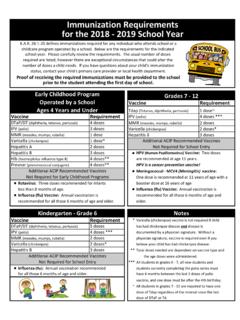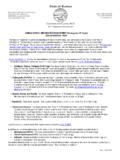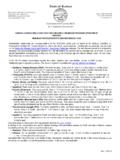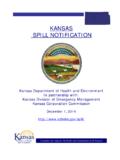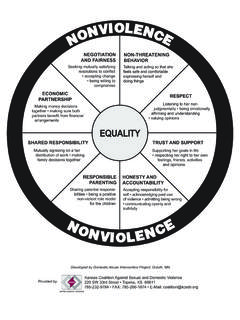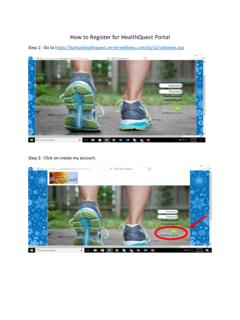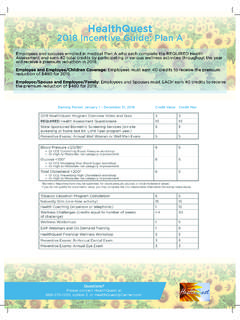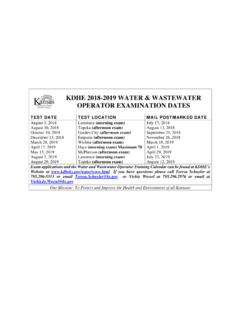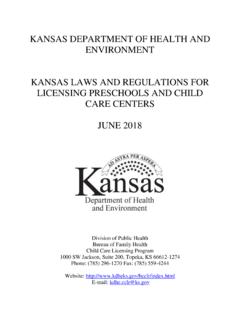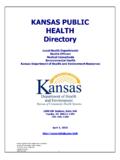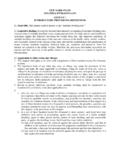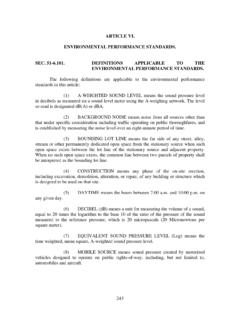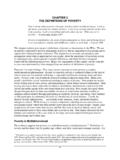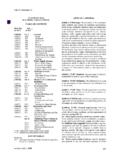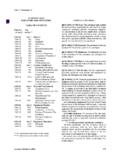Transcription of DEFINITIONS 28-34-1. 28-34-1a. Definitions.
1 Kansas Hospital Regulations November 2001. DEFINITIONS . 28-34-1. (Authorized by 65-431; effective January 1, 1969; revoked June 28, 1993.). 28-34-1a. DEFINITIONS . (a) "Authenticate" means to verify authorship by written signature, identifiable initials, or computer key. The use of rubber stamp signatures shall be acceptable if the following conditions are met. (1) The practitioner whose signature the rubber stamp represents shall be the only individual who has possession of the stamp and who uses the stamp. (2) The hospital shall maintain, in its administrative offices, a signed statement by the practitioner indicating that the practitioner is the only person who possesses and uses the stamp.
2 (b) "Chief executive officer" means the individual appointed by the governing body to act on its behalf in the overall management of the hospital. (c) "Consultant" means a person who provides professional advice or services on request. (d) Covering practitioner means a member of the hospital's medical staff who is authorized by the patient's attending physician or other practitioner to provide care and treatment for the patient in the absence of the attending physician or other practitioner. (e) "Dentist" means a person licensed in Kansas to practice dentistry. (f) "Dietitian" means a person who is licensed in Kansas as a dietitian.
3 (g) "Dietetic services supervisor" means a person who is trained and experienced in food service administration and meets one of the following requirements: (1) The person is a graduate of a dietetic technician training program approved by the American dietetic association or has completed the educational requirements for certification as a dietary manager. These programs may be conducted on either a classroom or correspondence basis. A program preceptor shall be a dietitian. (2) The person has the training and experience in dietetic services supervision and management that is determined by the secretary of health and environment to be equivalent to the programs specified in paragraph (g)(1).
4 Each dietetic services supervisor who qualifies under paragraph (g)(2) shall have a minimum of six months of experience as a supervisor in a health care institution. (h) "Director" means a person with administrative responsibility for the direction of a service for the hospital. When this term is used in connection with a medical or clinical service, it is synonymous with "chairperson" and may not imply a salaried individual. DEFINITIONS Page 1. Kansas Hospital Regulations November 2001. (i) "Drug administration" means the direct application of a drug or biological, whether by injection, inhalation, ingestion, or any other means, to the body of a patient by either of the following: (1) A practitioner, or pursuant to the lawful direction of a practitioner, who is acting within the scope of that practitioner's license and who is qualified according to medical staff bylaws; or (2) the patient at the direction and in the presence of a practitioner.
5 (j) "Drug dispensing" means delivering prescription medication to the patient pursuant to the lawful order of a practitioner. (k) "Facilities" means buildings, equipment, and supplies necessary for implementation of hospital services. (l) "Licensed practical nurse" means an individual who is licensed in Kansas as a licensed practical nurse. (m) "Licensing agency" means the Kansas department of health and environment. (n) "Long-term care unit" means a unit that provides physician services and continuous nursing supervision for patients who are not in an acute phase of illness and who currently require nursing care that is primarily of a convalescent, restorative, or long-term nature.
6 Medicare-certified, distinct-part, long-term care units shall be included. (o) "Nursing care unit" means an organized jurisdiction of nursing services in which nursing services are provided on a continuous basis. (p) "Nursing services" means patient care services pertaining to the curative, restorative, and preventive aspects of nursing that are performed or supervised by a registered nurse pursuant to the medical care plan of the practitioner and the nursing care plan. (q) "Organized" means administratively and functionally structured. (r) "Organized medical staff" means a formal organization of physicians and dentists, with the responsibility and authority to maintain proper standards for patient care as delegated by the governing body.
7 (s) "Outpatient services" means an organizational unit of the hospital that is designed to support the provision of nonemergency health care services to patients who do not remain in the hospital overnight. The term shall include a short-term procedure unit if applicable. (t) "Pathologist" means either of the following: DEFINITIONS Page 2. Kansas Hospital Regulations November 2001. (1) A person who is licensed in Kansas to practice medicine and surgery and who is a board-certified or board-eligible pathologist; or (2) a person licensed in Kansas as a dentist and certified as an oral pathologist.
8 (u) "Patient" means a person admitted to the hospital upon the order of a member of the medical staff. (v) "Physician" means a person licensed in Kansas to practice medicine and surgery. (w) "Practitioner" means a member of the hospital's medical staff and may include a physician or dentist. (x) "Qualified nurse anesthetist" means any of the following: (1) A registered nurse who has been certified as a nurse anesthetist by the council on certification of the American association of nurse anesthetists and has been authorized as a registered nurse anesthetist by the Kansas board of nursing.
9 (2) a student enrolled in a program of nurse anesthesia by the council on accreditation of the American association of nurse anesthetists; or (3) a graduate of an accredited program of nurse anesthesia who is awaiting certification testing or the results of the certification test and has been granted temporary authorization as a registered nurse anesthetist by the Kansas state board of nursing. (y) "Registered nurse" means a person who is licensed in Kansas as a registered professional nurse. (z) "Service" means either of the following: (1) A functional division of the hospital or of the nursing or medical staff; or (2) the delivery of care.
10 (aa) "Supervision" means authoritative procedural guidance provided by a qualified person for the accomplishment of a function or activity within that person's sphere of competence. Supervision shall include initial direction and periodic inspection of the actual act of accomplishing the function or activity. (bb) "Survey" means the process of evaluation or reevaluation of a hospital's compliance with this article. (Authorized by and implementing 65-431; effective June 28, 1993;. amended February 9, 2001amended November 26, 2001.). DEFINITIONS Page 3. Kansas Hospital Regulations November 2001.
